Corporate Social Responsibility in Niger Delta: A Critical Analysis
VerifiedAdded on 2023/04/08
|20
|3939
|323
Project
AI Summary
This project delves into the multifaceted aspects of Corporate Social Responsibility (CSR) within Nigeria's Niger Delta region, a critical area marked by significant oil production and its associated environmental and social challenges. The research meticulously investigates the drivers of CSR, including self-interest, community investment, and government regulations, while also analyzing the very concept of CSR and its evolution. The project aims to assess the effectiveness of CSR initiatives in the region, considering factors such as environmental protection, community development, and the role of multinational corporations. Through a comprehensive literature review, the project highlights the significance of CSR in addressing issues like poverty, environmental degradation, and social inequality. The research methodology includes a timeline and Gantt chart outlining the project's progress, with a focus on data collection and analysis to provide a thorough evaluation of CSR's impact on the Niger Delta and its inhabitants. Ethical considerations are addressed to ensure the integrity and validity of the research findings. The project concludes with a detailed analysis of the findings, offering recommendations for enhancing CSR practices in the region. This project provides valuable insights into the complex interplay between business operations, social responsibility, and sustainable development in a resource-rich environment.
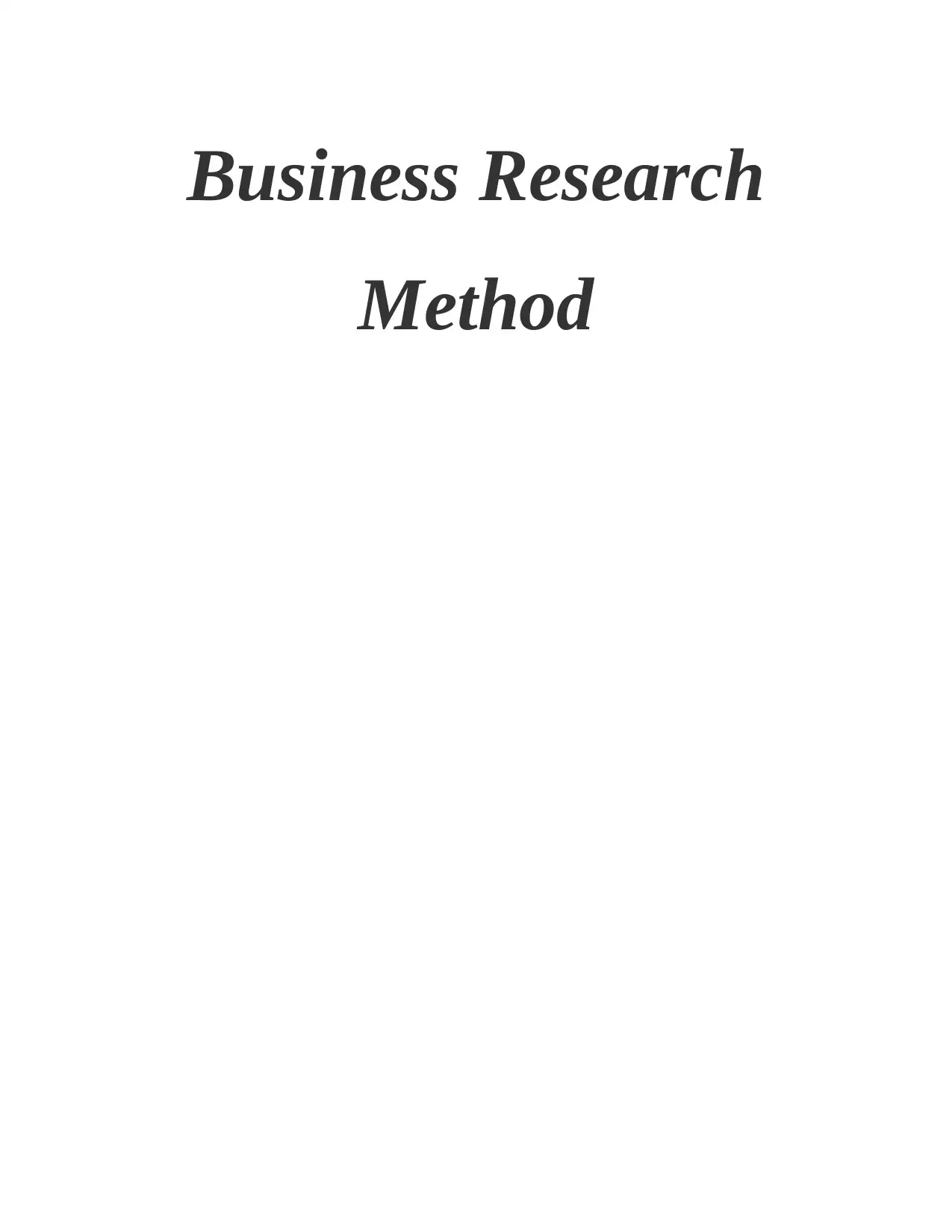
Business Research
Method
Method
Paraphrase This Document
Need a fresh take? Get an instant paraphrase of this document with our AI Paraphraser
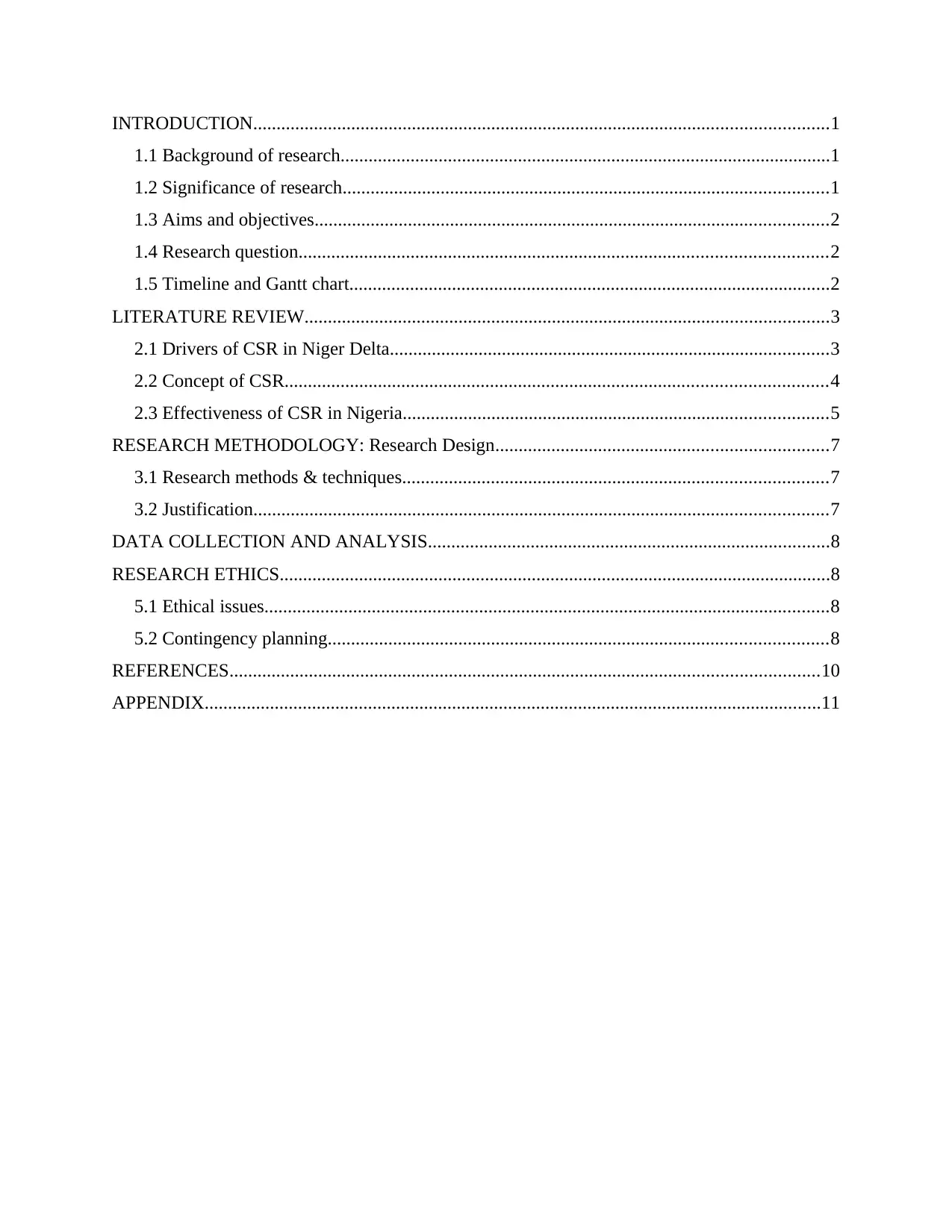
INTRODUCTION...........................................................................................................................1
1.1 Background of research.........................................................................................................1
1.2 Significance of research........................................................................................................1
1.3 Aims and objectives..............................................................................................................2
1.4 Research question.................................................................................................................2
1.5 Timeline and Gantt chart.......................................................................................................2
LITERATURE REVIEW................................................................................................................3
2.1 Drivers of CSR in Niger Delta..............................................................................................3
2.2 Concept of CSR....................................................................................................................4
2.3 Effectiveness of CSR in Nigeria...........................................................................................5
RESEARCH METHODOLOGY: Research Design.......................................................................7
3.1 Research methods & techniques...........................................................................................7
3.2 Justification...........................................................................................................................7
DATA COLLECTION AND ANALYSIS......................................................................................8
RESEARCH ETHICS......................................................................................................................8
5.1 Ethical issues.........................................................................................................................8
5.2 Contingency planning...........................................................................................................8
REFERENCES..............................................................................................................................10
APPENDIX....................................................................................................................................11
1.1 Background of research.........................................................................................................1
1.2 Significance of research........................................................................................................1
1.3 Aims and objectives..............................................................................................................2
1.4 Research question.................................................................................................................2
1.5 Timeline and Gantt chart.......................................................................................................2
LITERATURE REVIEW................................................................................................................3
2.1 Drivers of CSR in Niger Delta..............................................................................................3
2.2 Concept of CSR....................................................................................................................4
2.3 Effectiveness of CSR in Nigeria...........................................................................................5
RESEARCH METHODOLOGY: Research Design.......................................................................7
3.1 Research methods & techniques...........................................................................................7
3.2 Justification...........................................................................................................................7
DATA COLLECTION AND ANALYSIS......................................................................................8
RESEARCH ETHICS......................................................................................................................8
5.1 Ethical issues.........................................................................................................................8
5.2 Contingency planning...........................................................................................................8
REFERENCES..............................................................................................................................10
APPENDIX....................................................................................................................................11
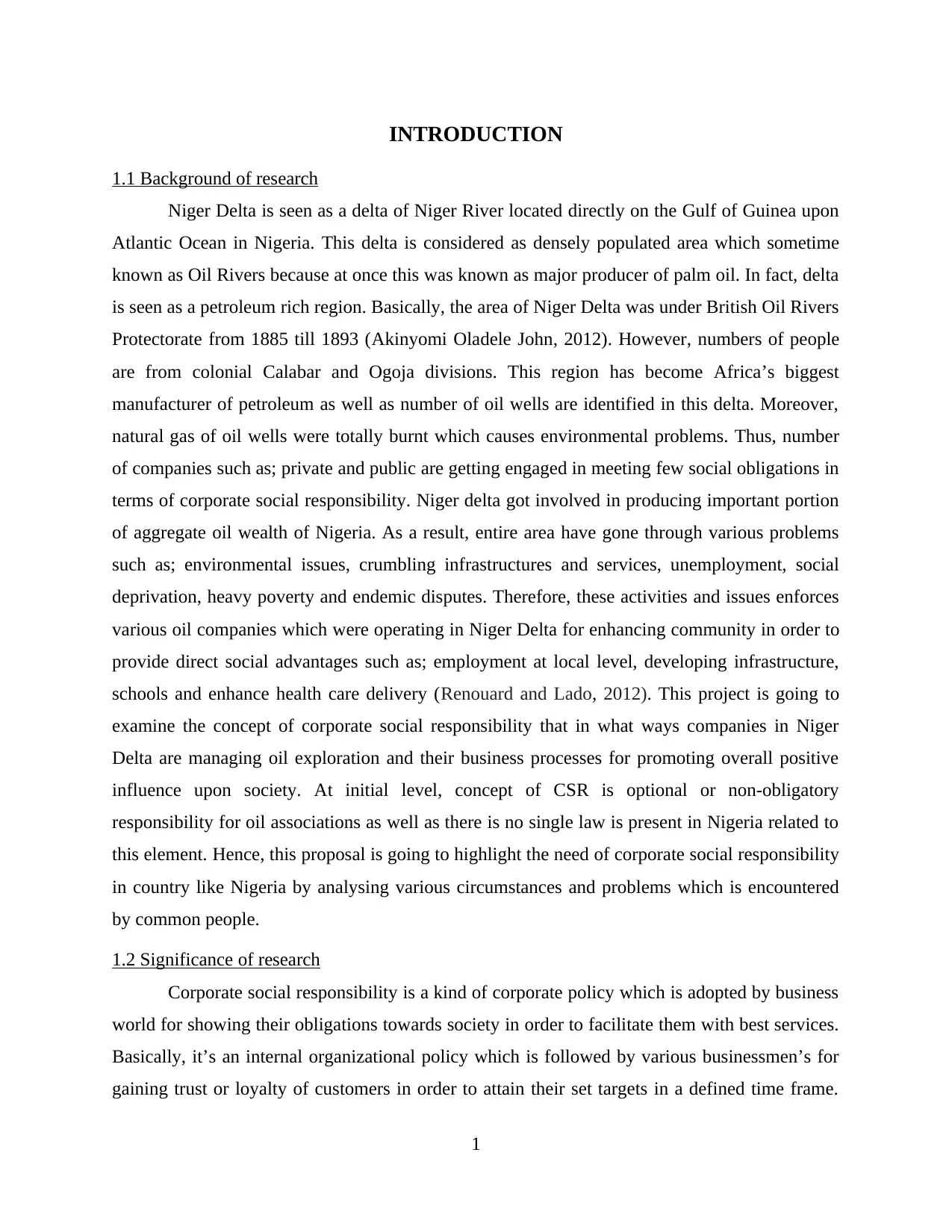
INTRODUCTION
1.1 Background of research
Niger Delta is seen as a delta of Niger River located directly on the Gulf of Guinea upon
Atlantic Ocean in Nigeria. This delta is considered as densely populated area which sometime
known as Oil Rivers because at once this was known as major producer of palm oil. In fact, delta
is seen as a petroleum rich region. Basically, the area of Niger Delta was under British Oil Rivers
Protectorate from 1885 till 1893 (Akinyomi Oladele John, 2012). However, numbers of people
are from colonial Calabar and Ogoja divisions. This region has become Africa’s biggest
manufacturer of petroleum as well as number of oil wells are identified in this delta. Moreover,
natural gas of oil wells were totally burnt which causes environmental problems. Thus, number
of companies such as; private and public are getting engaged in meeting few social obligations in
terms of corporate social responsibility. Niger delta got involved in producing important portion
of aggregate oil wealth of Nigeria. As a result, entire area have gone through various problems
such as; environmental issues, crumbling infrastructures and services, unemployment, social
deprivation, heavy poverty and endemic disputes. Therefore, these activities and issues enforces
various oil companies which were operating in Niger Delta for enhancing community in order to
provide direct social advantages such as; employment at local level, developing infrastructure,
schools and enhance health care delivery (Renouard and Lado, 2012). This project is going to
examine the concept of corporate social responsibility that in what ways companies in Niger
Delta are managing oil exploration and their business processes for promoting overall positive
influence upon society. At initial level, concept of CSR is optional or non-obligatory
responsibility for oil associations as well as there is no single law is present in Nigeria related to
this element. Hence, this proposal is going to highlight the need of corporate social responsibility
in country like Nigeria by analysing various circumstances and problems which is encountered
by common people.
1.2 Significance of research
Corporate social responsibility is a kind of corporate policy which is adopted by business
world for showing their obligations towards society in order to facilitate them with best services.
Basically, it’s an internal organizational policy which is followed by various businessmen’s for
gaining trust or loyalty of customers in order to attain their set targets in a defined time frame.
1
1.1 Background of research
Niger Delta is seen as a delta of Niger River located directly on the Gulf of Guinea upon
Atlantic Ocean in Nigeria. This delta is considered as densely populated area which sometime
known as Oil Rivers because at once this was known as major producer of palm oil. In fact, delta
is seen as a petroleum rich region. Basically, the area of Niger Delta was under British Oil Rivers
Protectorate from 1885 till 1893 (Akinyomi Oladele John, 2012). However, numbers of people
are from colonial Calabar and Ogoja divisions. This region has become Africa’s biggest
manufacturer of petroleum as well as number of oil wells are identified in this delta. Moreover,
natural gas of oil wells were totally burnt which causes environmental problems. Thus, number
of companies such as; private and public are getting engaged in meeting few social obligations in
terms of corporate social responsibility. Niger delta got involved in producing important portion
of aggregate oil wealth of Nigeria. As a result, entire area have gone through various problems
such as; environmental issues, crumbling infrastructures and services, unemployment, social
deprivation, heavy poverty and endemic disputes. Therefore, these activities and issues enforces
various oil companies which were operating in Niger Delta for enhancing community in order to
provide direct social advantages such as; employment at local level, developing infrastructure,
schools and enhance health care delivery (Renouard and Lado, 2012). This project is going to
examine the concept of corporate social responsibility that in what ways companies in Niger
Delta are managing oil exploration and their business processes for promoting overall positive
influence upon society. At initial level, concept of CSR is optional or non-obligatory
responsibility for oil associations as well as there is no single law is present in Nigeria related to
this element. Hence, this proposal is going to highlight the need of corporate social responsibility
in country like Nigeria by analysing various circumstances and problems which is encountered
by common people.
1.2 Significance of research
Corporate social responsibility is a kind of corporate policy which is adopted by business
world for showing their obligations towards society in order to facilitate them with best services.
Basically, it’s an internal organizational policy which is followed by various businessmen’s for
gaining trust or loyalty of customers in order to attain their set targets in a defined time frame.
1
⊘ This is a preview!⊘
Do you want full access?
Subscribe today to unlock all pages.

Trusted by 1+ million students worldwide
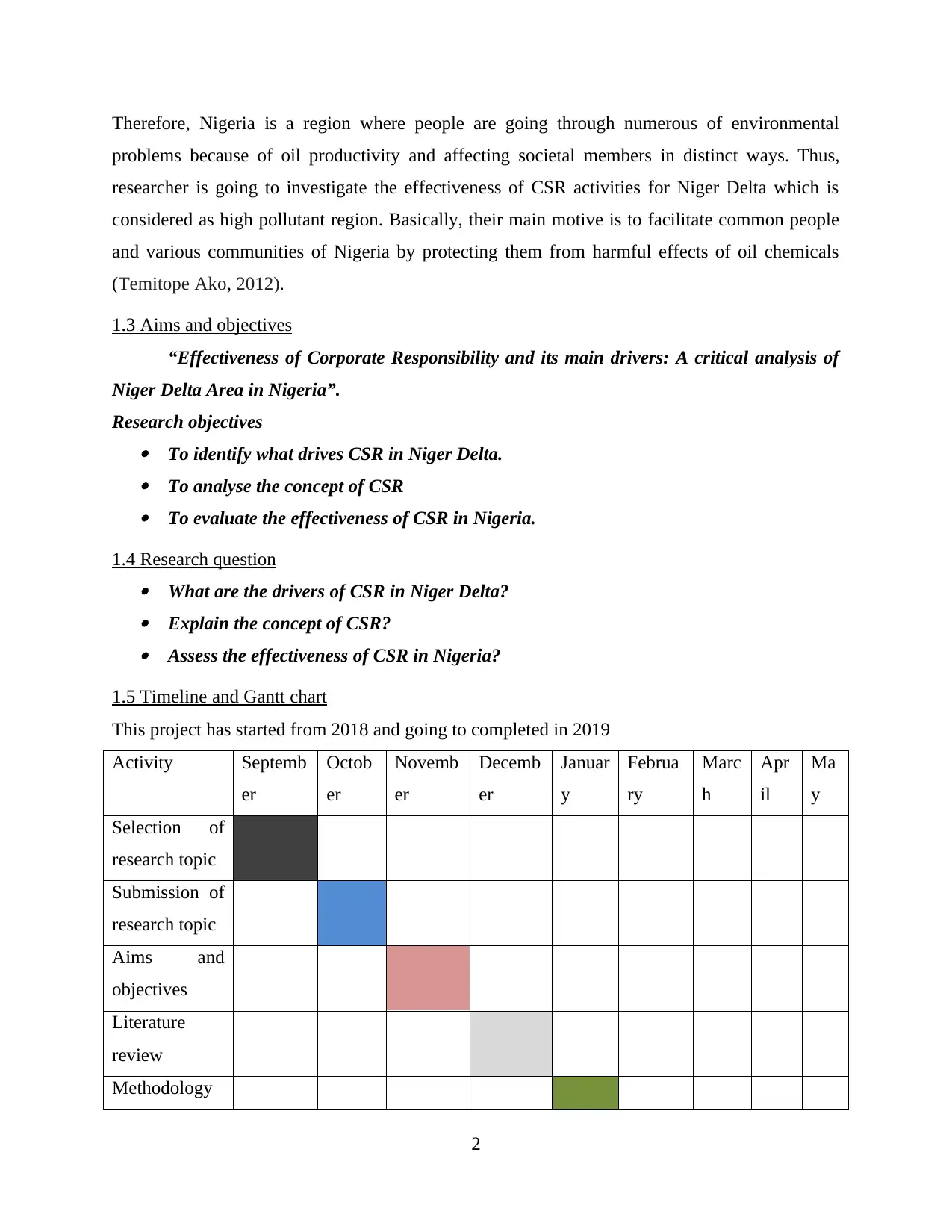
Therefore, Nigeria is a region where people are going through numerous of environmental
problems because of oil productivity and affecting societal members in distinct ways. Thus,
researcher is going to investigate the effectiveness of CSR activities for Niger Delta which is
considered as high pollutant region. Basically, their main motive is to facilitate common people
and various communities of Nigeria by protecting them from harmful effects of oil chemicals
(Temitope Ako, 2012).
1.3 Aims and objectives
“Effectiveness of Corporate Responsibility and its main drivers: A critical analysis of
Niger Delta Area in Nigeria”.
Research objectives To identify what drives CSR in Niger Delta. To analyse the concept of CSR To evaluate the effectiveness of CSR in Nigeria.
1.4 Research question What are the drivers of CSR in Niger Delta? Explain the concept of CSR? Assess the effectiveness of CSR in Nigeria?
1.5 Timeline and Gantt chart
This project has started from 2018 and going to completed in 2019
Activity Septemb
er
Octob
er
Novemb
er
Decemb
er
Januar
y
Februa
ry
Marc
h
Apr
il
Ma
y
Selection of
research topic
Submission of
research topic
Aims and
objectives
Literature
review
Methodology
2
problems because of oil productivity and affecting societal members in distinct ways. Thus,
researcher is going to investigate the effectiveness of CSR activities for Niger Delta which is
considered as high pollutant region. Basically, their main motive is to facilitate common people
and various communities of Nigeria by protecting them from harmful effects of oil chemicals
(Temitope Ako, 2012).
1.3 Aims and objectives
“Effectiveness of Corporate Responsibility and its main drivers: A critical analysis of
Niger Delta Area in Nigeria”.
Research objectives To identify what drives CSR in Niger Delta. To analyse the concept of CSR To evaluate the effectiveness of CSR in Nigeria.
1.4 Research question What are the drivers of CSR in Niger Delta? Explain the concept of CSR? Assess the effectiveness of CSR in Nigeria?
1.5 Timeline and Gantt chart
This project has started from 2018 and going to completed in 2019
Activity Septemb
er
Octob
er
Novemb
er
Decemb
er
Januar
y
Februa
ry
Marc
h
Apr
il
Ma
y
Selection of
research topic
Submission of
research topic
Aims and
objectives
Literature
review
Methodology
2
Paraphrase This Document
Need a fresh take? Get an instant paraphrase of this document with our AI Paraphraser
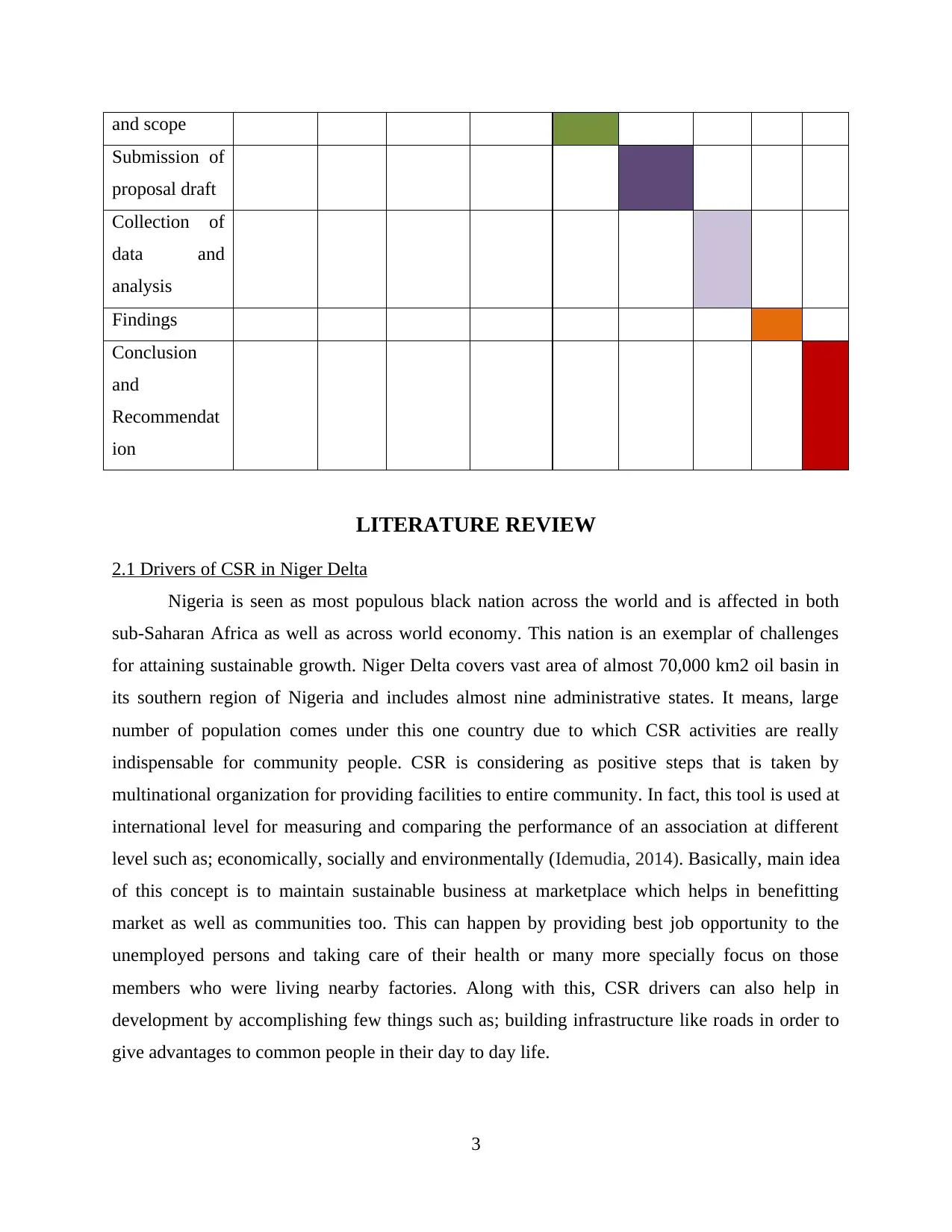
and scope
Submission of
proposal draft
Collection of
data and
analysis
Findings
Conclusion
and
Recommendat
ion
LITERATURE REVIEW
2.1 Drivers of CSR in Niger Delta
Nigeria is seen as most populous black nation across the world and is affected in both
sub-Saharan Africa as well as across world economy. This nation is an exemplar of challenges
for attaining sustainable growth. Niger Delta covers vast area of almost 70,000 km2 oil basin in
its southern region of Nigeria and includes almost nine administrative states. It means, large
number of population comes under this one country due to which CSR activities are really
indispensable for community people. CSR is considering as positive steps that is taken by
multinational organization for providing facilities to entire community. In fact, this tool is used at
international level for measuring and comparing the performance of an association at different
level such as; economically, socially and environmentally (Idemudia, 2014). Basically, main idea
of this concept is to maintain sustainable business at marketplace which helps in benefitting
market as well as communities too. This can happen by providing best job opportunity to the
unemployed persons and taking care of their health or many more specially focus on those
members who were living nearby factories. Along with this, CSR drivers can also help in
development by accomplishing few things such as; building infrastructure like roads in order to
give advantages to common people in their day to day life.
3
Submission of
proposal draft
Collection of
data and
analysis
Findings
Conclusion
and
Recommendat
ion
LITERATURE REVIEW
2.1 Drivers of CSR in Niger Delta
Nigeria is seen as most populous black nation across the world and is affected in both
sub-Saharan Africa as well as across world economy. This nation is an exemplar of challenges
for attaining sustainable growth. Niger Delta covers vast area of almost 70,000 km2 oil basin in
its southern region of Nigeria and includes almost nine administrative states. It means, large
number of population comes under this one country due to which CSR activities are really
indispensable for community people. CSR is considering as positive steps that is taken by
multinational organization for providing facilities to entire community. In fact, this tool is used at
international level for measuring and comparing the performance of an association at different
level such as; economically, socially and environmentally (Idemudia, 2014). Basically, main idea
of this concept is to maintain sustainable business at marketplace which helps in benefitting
market as well as communities too. This can happen by providing best job opportunity to the
unemployed persons and taking care of their health or many more specially focus on those
members who were living nearby factories. Along with this, CSR drivers can also help in
development by accomplishing few things such as; building infrastructure like roads in order to
give advantages to common people in their day to day life.
3
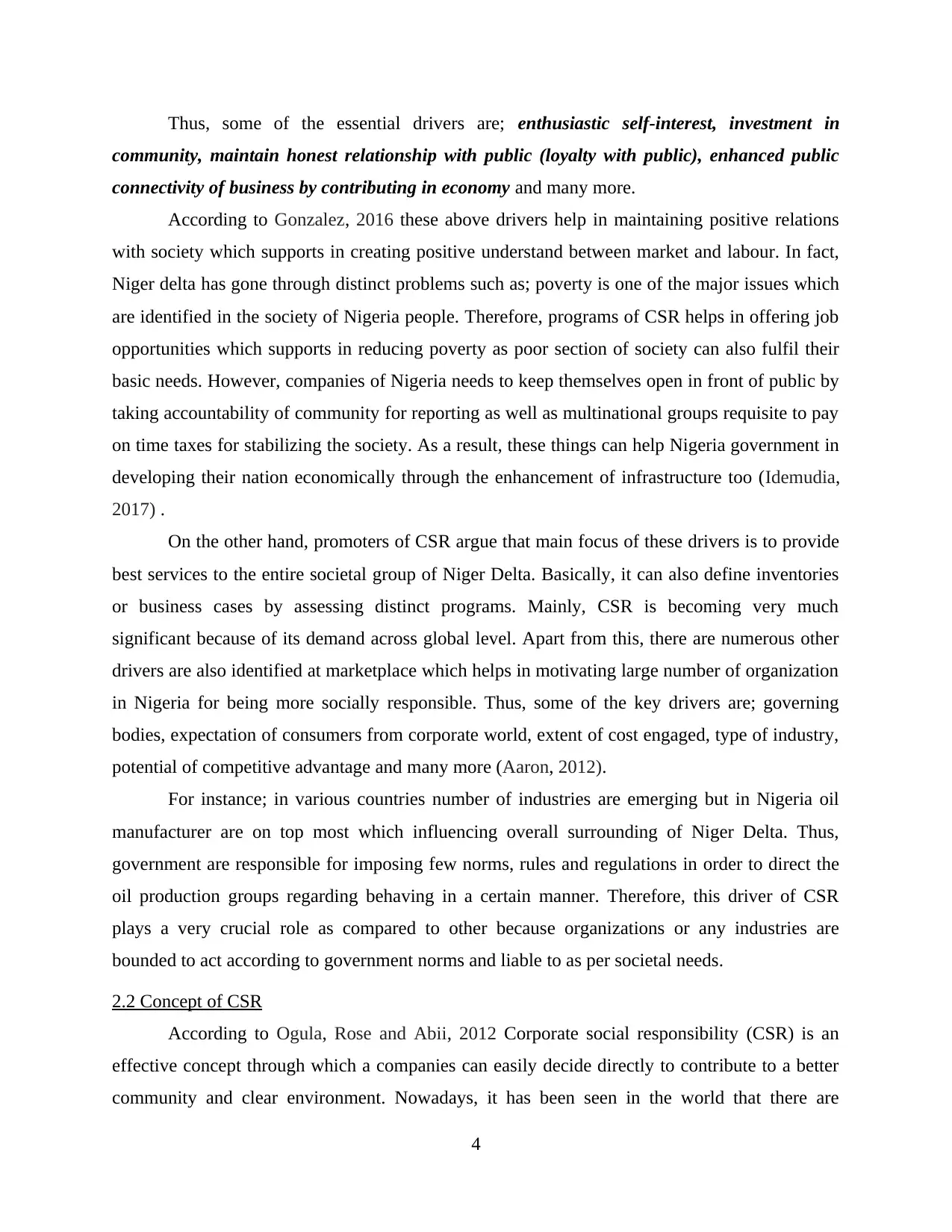
Thus, some of the essential drivers are; enthusiastic self-interest, investment in
community, maintain honest relationship with public (loyalty with public), enhanced public
connectivity of business by contributing in economy and many more.
According to Gonzalez, 2016 these above drivers help in maintaining positive relations
with society which supports in creating positive understand between market and labour. In fact,
Niger delta has gone through distinct problems such as; poverty is one of the major issues which
are identified in the society of Nigeria people. Therefore, programs of CSR helps in offering job
opportunities which supports in reducing poverty as poor section of society can also fulfil their
basic needs. However, companies of Nigeria needs to keep themselves open in front of public by
taking accountability of community for reporting as well as multinational groups requisite to pay
on time taxes for stabilizing the society. As a result, these things can help Nigeria government in
developing their nation economically through the enhancement of infrastructure too (Idemudia,
2017) .
On the other hand, promoters of CSR argue that main focus of these drivers is to provide
best services to the entire societal group of Niger Delta. Basically, it can also define inventories
or business cases by assessing distinct programs. Mainly, CSR is becoming very much
significant because of its demand across global level. Apart from this, there are numerous other
drivers are also identified at marketplace which helps in motivating large number of organization
in Nigeria for being more socially responsible. Thus, some of the key drivers are; governing
bodies, expectation of consumers from corporate world, extent of cost engaged, type of industry,
potential of competitive advantage and many more (Aaron, 2012).
For instance; in various countries number of industries are emerging but in Nigeria oil
manufacturer are on top most which influencing overall surrounding of Niger Delta. Thus,
government are responsible for imposing few norms, rules and regulations in order to direct the
oil production groups regarding behaving in a certain manner. Therefore, this driver of CSR
plays a very crucial role as compared to other because organizations or any industries are
bounded to act according to government norms and liable to as per societal needs.
2.2 Concept of CSR
According to Ogula, Rose and Abii, 2012 Corporate social responsibility (CSR) is an
effective concept through which a companies can easily decide directly to contribute to a better
community and clear environment. Nowadays, it has been seen in the world that there are
4
community, maintain honest relationship with public (loyalty with public), enhanced public
connectivity of business by contributing in economy and many more.
According to Gonzalez, 2016 these above drivers help in maintaining positive relations
with society which supports in creating positive understand between market and labour. In fact,
Niger delta has gone through distinct problems such as; poverty is one of the major issues which
are identified in the society of Nigeria people. Therefore, programs of CSR helps in offering job
opportunities which supports in reducing poverty as poor section of society can also fulfil their
basic needs. However, companies of Nigeria needs to keep themselves open in front of public by
taking accountability of community for reporting as well as multinational groups requisite to pay
on time taxes for stabilizing the society. As a result, these things can help Nigeria government in
developing their nation economically through the enhancement of infrastructure too (Idemudia,
2017) .
On the other hand, promoters of CSR argue that main focus of these drivers is to provide
best services to the entire societal group of Niger Delta. Basically, it can also define inventories
or business cases by assessing distinct programs. Mainly, CSR is becoming very much
significant because of its demand across global level. Apart from this, there are numerous other
drivers are also identified at marketplace which helps in motivating large number of organization
in Nigeria for being more socially responsible. Thus, some of the key drivers are; governing
bodies, expectation of consumers from corporate world, extent of cost engaged, type of industry,
potential of competitive advantage and many more (Aaron, 2012).
For instance; in various countries number of industries are emerging but in Nigeria oil
manufacturer are on top most which influencing overall surrounding of Niger Delta. Thus,
government are responsible for imposing few norms, rules and regulations in order to direct the
oil production groups regarding behaving in a certain manner. Therefore, this driver of CSR
plays a very crucial role as compared to other because organizations or any industries are
bounded to act according to government norms and liable to as per societal needs.
2.2 Concept of CSR
According to Ogula, Rose and Abii, 2012 Corporate social responsibility (CSR) is an
effective concept through which a companies can easily decide directly to contribute to a better
community and clear environment. Nowadays, it has been seen in the world that there are
4
⊘ This is a preview!⊘
Do you want full access?
Subscribe today to unlock all pages.

Trusted by 1+ million students worldwide
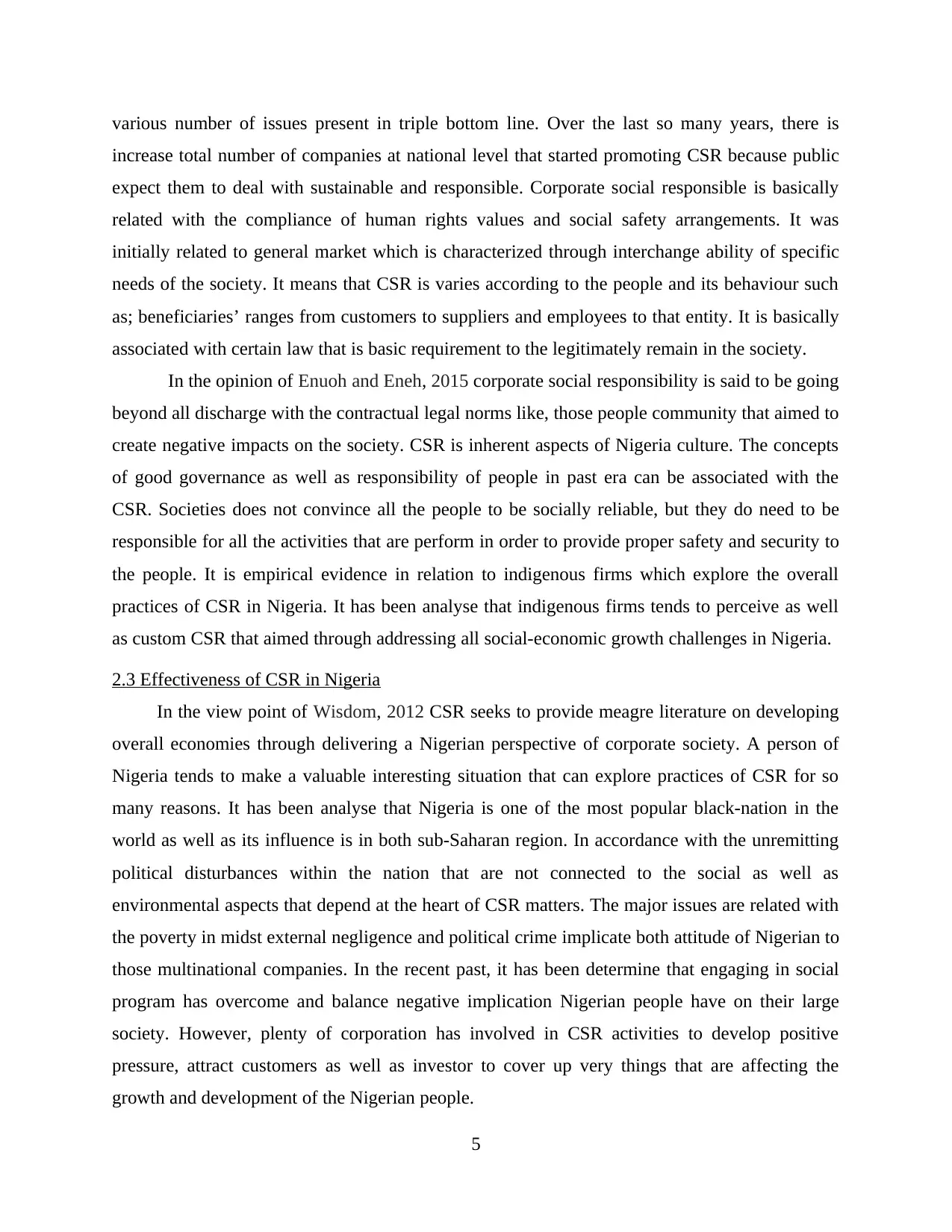
various number of issues present in triple bottom line. Over the last so many years, there is
increase total number of companies at national level that started promoting CSR because public
expect them to deal with sustainable and responsible. Corporate social responsible is basically
related with the compliance of human rights values and social safety arrangements. It was
initially related to general market which is characterized through interchange ability of specific
needs of the society. It means that CSR is varies according to the people and its behaviour such
as; beneficiaries’ ranges from customers to suppliers and employees to that entity. It is basically
associated with certain law that is basic requirement to the legitimately remain in the society.
In the opinion of Enuoh and Eneh, 2015 corporate social responsibility is said to be going
beyond all discharge with the contractual legal norms like, those people community that aimed to
create negative impacts on the society. CSR is inherent aspects of Nigeria culture. The concepts
of good governance as well as responsibility of people in past era can be associated with the
CSR. Societies does not convince all the people to be socially reliable, but they do need to be
responsible for all the activities that are perform in order to provide proper safety and security to
the people. It is empirical evidence in relation to indigenous firms which explore the overall
practices of CSR in Nigeria. It has been analyse that indigenous firms tends to perceive as well
as custom CSR that aimed through addressing all social-economic growth challenges in Nigeria.
2.3 Effectiveness of CSR in Nigeria
In the view point of Wisdom, 2012 CSR seeks to provide meagre literature on developing
overall economies through delivering a Nigerian perspective of corporate society. A person of
Nigeria tends to make a valuable interesting situation that can explore practices of CSR for so
many reasons. It has been analyse that Nigeria is one of the most popular black-nation in the
world as well as its influence is in both sub-Saharan region. In accordance with the unremitting
political disturbances within the nation that are not connected to the social as well as
environmental aspects that depend at the heart of CSR matters. The major issues are related with
the poverty in midst external negligence and political crime implicate both attitude of Nigerian to
those multinational companies. In the recent past, it has been determine that engaging in social
program has overcome and balance negative implication Nigerian people have on their large
society. However, plenty of corporation has involved in CSR activities to develop positive
pressure, attract customers as well as investor to cover up very things that are affecting the
growth and development of the Nigerian people.
5
increase total number of companies at national level that started promoting CSR because public
expect them to deal with sustainable and responsible. Corporate social responsible is basically
related with the compliance of human rights values and social safety arrangements. It was
initially related to general market which is characterized through interchange ability of specific
needs of the society. It means that CSR is varies according to the people and its behaviour such
as; beneficiaries’ ranges from customers to suppliers and employees to that entity. It is basically
associated with certain law that is basic requirement to the legitimately remain in the society.
In the opinion of Enuoh and Eneh, 2015 corporate social responsibility is said to be going
beyond all discharge with the contractual legal norms like, those people community that aimed to
create negative impacts on the society. CSR is inherent aspects of Nigeria culture. The concepts
of good governance as well as responsibility of people in past era can be associated with the
CSR. Societies does not convince all the people to be socially reliable, but they do need to be
responsible for all the activities that are perform in order to provide proper safety and security to
the people. It is empirical evidence in relation to indigenous firms which explore the overall
practices of CSR in Nigeria. It has been analyse that indigenous firms tends to perceive as well
as custom CSR that aimed through addressing all social-economic growth challenges in Nigeria.
2.3 Effectiveness of CSR in Nigeria
In the view point of Wisdom, 2012 CSR seeks to provide meagre literature on developing
overall economies through delivering a Nigerian perspective of corporate society. A person of
Nigeria tends to make a valuable interesting situation that can explore practices of CSR for so
many reasons. It has been analyse that Nigeria is one of the most popular black-nation in the
world as well as its influence is in both sub-Saharan region. In accordance with the unremitting
political disturbances within the nation that are not connected to the social as well as
environmental aspects that depend at the heart of CSR matters. The major issues are related with
the poverty in midst external negligence and political crime implicate both attitude of Nigerian to
those multinational companies. In the recent past, it has been determine that engaging in social
program has overcome and balance negative implication Nigerian people have on their large
society. However, plenty of corporation has involved in CSR activities to develop positive
pressure, attract customers as well as investor to cover up very things that are affecting the
growth and development of the Nigerian people.
5
Paraphrase This Document
Need a fresh take? Get an instant paraphrase of this document with our AI Paraphraser
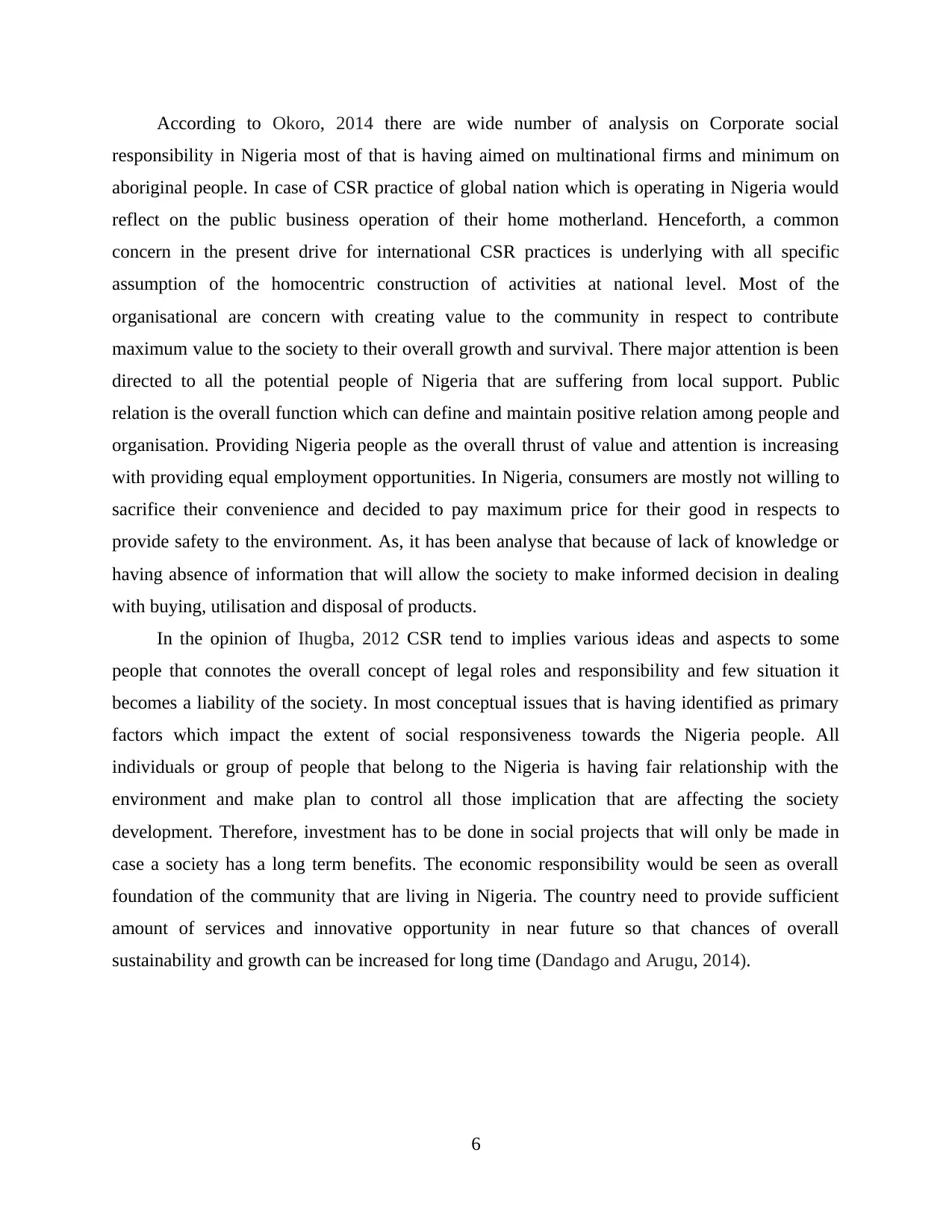
According to Okoro, 2014 there are wide number of analysis on Corporate social
responsibility in Nigeria most of that is having aimed on multinational firms and minimum on
aboriginal people. In case of CSR practice of global nation which is operating in Nigeria would
reflect on the public business operation of their home motherland. Henceforth, a common
concern in the present drive for international CSR practices is underlying with all specific
assumption of the homocentric construction of activities at national level. Most of the
organisational are concern with creating value to the community in respect to contribute
maximum value to the society to their overall growth and survival. There major attention is been
directed to all the potential people of Nigeria that are suffering from local support. Public
relation is the overall function which can define and maintain positive relation among people and
organisation. Providing Nigeria people as the overall thrust of value and attention is increasing
with providing equal employment opportunities. In Nigeria, consumers are mostly not willing to
sacrifice their convenience and decided to pay maximum price for their good in respects to
provide safety to the environment. As, it has been analyse that because of lack of knowledge or
having absence of information that will allow the society to make informed decision in dealing
with buying, utilisation and disposal of products.
In the opinion of Ihugba, 2012 CSR tend to implies various ideas and aspects to some
people that connotes the overall concept of legal roles and responsibility and few situation it
becomes a liability of the society. In most conceptual issues that is having identified as primary
factors which impact the extent of social responsiveness towards the Nigeria people. All
individuals or group of people that belong to the Nigeria is having fair relationship with the
environment and make plan to control all those implication that are affecting the society
development. Therefore, investment has to be done in social projects that will only be made in
case a society has a long term benefits. The economic responsibility would be seen as overall
foundation of the community that are living in Nigeria. The country need to provide sufficient
amount of services and innovative opportunity in near future so that chances of overall
sustainability and growth can be increased for long time (Dandago and Arugu, 2014).
6
responsibility in Nigeria most of that is having aimed on multinational firms and minimum on
aboriginal people. In case of CSR practice of global nation which is operating in Nigeria would
reflect on the public business operation of their home motherland. Henceforth, a common
concern in the present drive for international CSR practices is underlying with all specific
assumption of the homocentric construction of activities at national level. Most of the
organisational are concern with creating value to the community in respect to contribute
maximum value to the society to their overall growth and survival. There major attention is been
directed to all the potential people of Nigeria that are suffering from local support. Public
relation is the overall function which can define and maintain positive relation among people and
organisation. Providing Nigeria people as the overall thrust of value and attention is increasing
with providing equal employment opportunities. In Nigeria, consumers are mostly not willing to
sacrifice their convenience and decided to pay maximum price for their good in respects to
provide safety to the environment. As, it has been analyse that because of lack of knowledge or
having absence of information that will allow the society to make informed decision in dealing
with buying, utilisation and disposal of products.
In the opinion of Ihugba, 2012 CSR tend to implies various ideas and aspects to some
people that connotes the overall concept of legal roles and responsibility and few situation it
becomes a liability of the society. In most conceptual issues that is having identified as primary
factors which impact the extent of social responsiveness towards the Nigeria people. All
individuals or group of people that belong to the Nigeria is having fair relationship with the
environment and make plan to control all those implication that are affecting the society
development. Therefore, investment has to be done in social projects that will only be made in
case a society has a long term benefits. The economic responsibility would be seen as overall
foundation of the community that are living in Nigeria. The country need to provide sufficient
amount of services and innovative opportunity in near future so that chances of overall
sustainability and growth can be increased for long time (Dandago and Arugu, 2014).
6
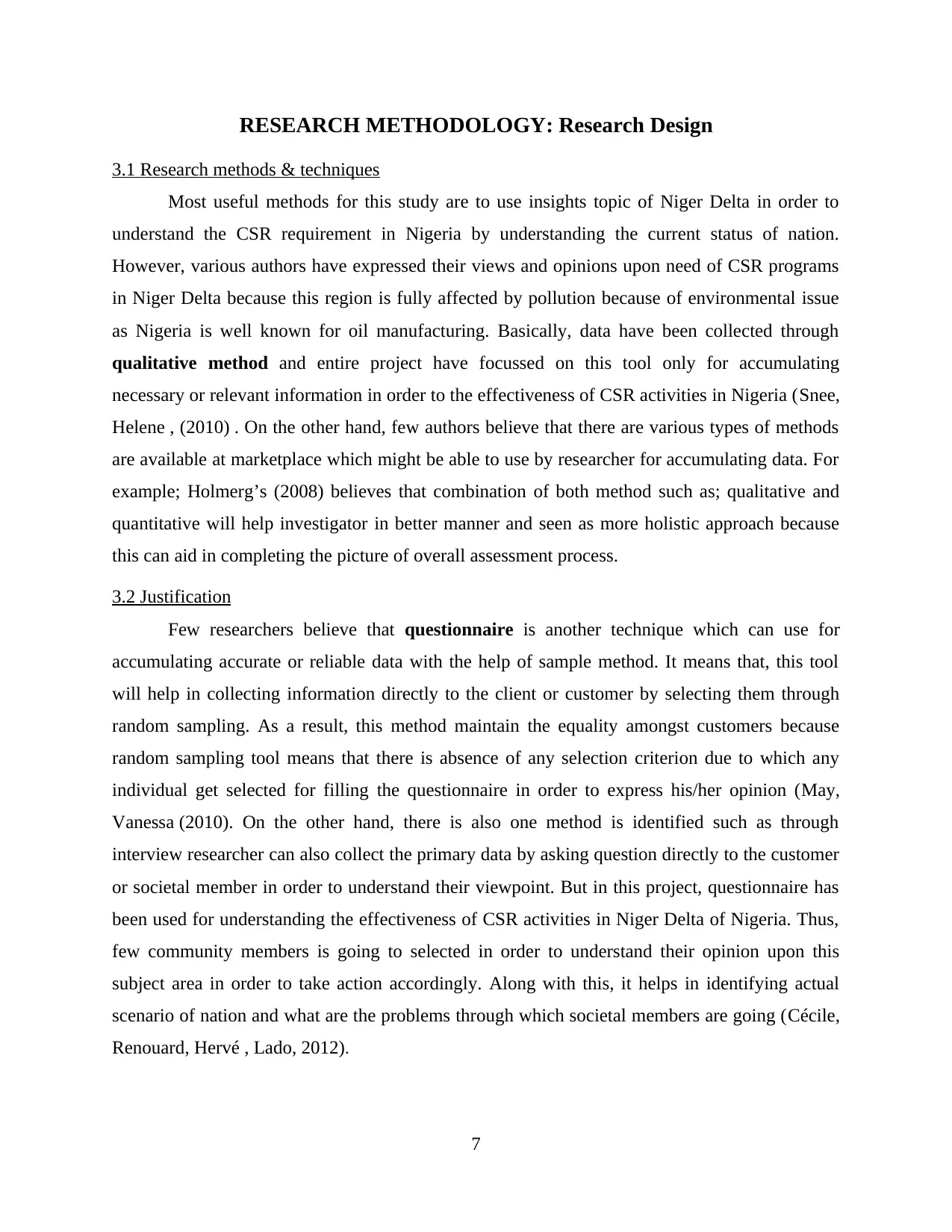
RESEARCH METHODOLOGY: Research Design
3.1 Research methods & techniques
Most useful methods for this study are to use insights topic of Niger Delta in order to
understand the CSR requirement in Nigeria by understanding the current status of nation.
However, various authors have expressed their views and opinions upon need of CSR programs
in Niger Delta because this region is fully affected by pollution because of environmental issue
as Nigeria is well known for oil manufacturing. Basically, data have been collected through
qualitative method and entire project have focussed on this tool only for accumulating
necessary or relevant information in order to the effectiveness of CSR activities in Nigeria (Snee,
Helene , (2010) . On the other hand, few authors believe that there are various types of methods
are available at marketplace which might be able to use by researcher for accumulating data. For
example; Holmerg’s (2008) believes that combination of both method such as; qualitative and
quantitative will help investigator in better manner and seen as more holistic approach because
this can aid in completing the picture of overall assessment process.
3.2 Justification
Few researchers believe that questionnaire is another technique which can use for
accumulating accurate or reliable data with the help of sample method. It means that, this tool
will help in collecting information directly to the client or customer by selecting them through
random sampling. As a result, this method maintain the equality amongst customers because
random sampling tool means that there is absence of any selection criterion due to which any
individual get selected for filling the questionnaire in order to express his/her opinion (May,
Vanessa (2010). On the other hand, there is also one method is identified such as through
interview researcher can also collect the primary data by asking question directly to the customer
or societal member in order to understand their viewpoint. But in this project, questionnaire has
been used for understanding the effectiveness of CSR activities in Niger Delta of Nigeria. Thus,
few community members is going to selected in order to understand their opinion upon this
subject area in order to take action accordingly. Along with this, it helps in identifying actual
scenario of nation and what are the problems through which societal members are going (Cécile,
Renouard, Hervé , Lado, 2012).
7
3.1 Research methods & techniques
Most useful methods for this study are to use insights topic of Niger Delta in order to
understand the CSR requirement in Nigeria by understanding the current status of nation.
However, various authors have expressed their views and opinions upon need of CSR programs
in Niger Delta because this region is fully affected by pollution because of environmental issue
as Nigeria is well known for oil manufacturing. Basically, data have been collected through
qualitative method and entire project have focussed on this tool only for accumulating
necessary or relevant information in order to the effectiveness of CSR activities in Nigeria (Snee,
Helene , (2010) . On the other hand, few authors believe that there are various types of methods
are available at marketplace which might be able to use by researcher for accumulating data. For
example; Holmerg’s (2008) believes that combination of both method such as; qualitative and
quantitative will help investigator in better manner and seen as more holistic approach because
this can aid in completing the picture of overall assessment process.
3.2 Justification
Few researchers believe that questionnaire is another technique which can use for
accumulating accurate or reliable data with the help of sample method. It means that, this tool
will help in collecting information directly to the client or customer by selecting them through
random sampling. As a result, this method maintain the equality amongst customers because
random sampling tool means that there is absence of any selection criterion due to which any
individual get selected for filling the questionnaire in order to express his/her opinion (May,
Vanessa (2010). On the other hand, there is also one method is identified such as through
interview researcher can also collect the primary data by asking question directly to the customer
or societal member in order to understand their viewpoint. But in this project, questionnaire has
been used for understanding the effectiveness of CSR activities in Niger Delta of Nigeria. Thus,
few community members is going to selected in order to understand their opinion upon this
subject area in order to take action accordingly. Along with this, it helps in identifying actual
scenario of nation and what are the problems through which societal members are going (Cécile,
Renouard, Hervé , Lado, 2012).
7
⊘ This is a preview!⊘
Do you want full access?
Subscribe today to unlock all pages.

Trusted by 1+ million students worldwide
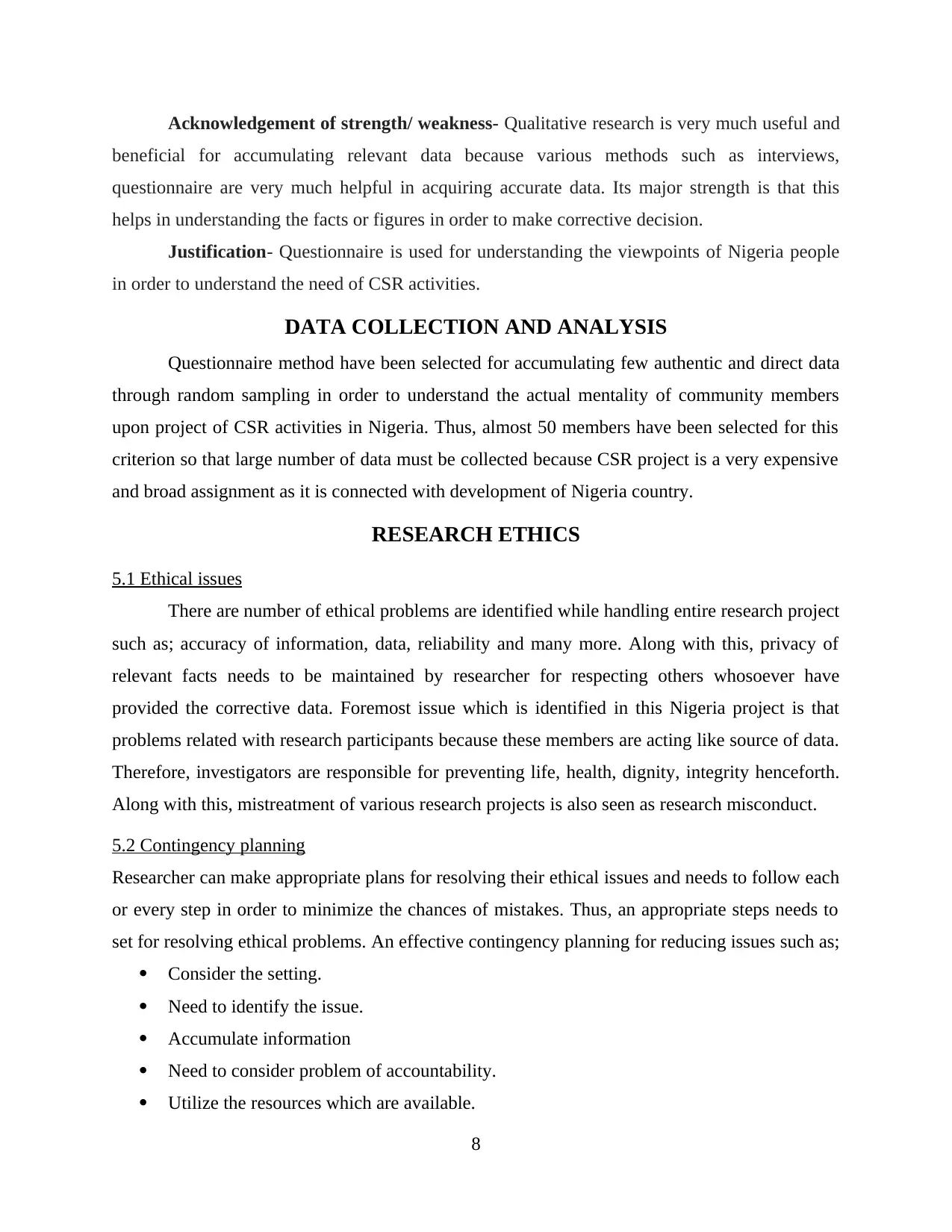
Acknowledgement of strength/ weakness- Qualitative research is very much useful and
beneficial for accumulating relevant data because various methods such as interviews,
questionnaire are very much helpful in acquiring accurate data. Its major strength is that this
helps in understanding the facts or figures in order to make corrective decision.
Justification- Questionnaire is used for understanding the viewpoints of Nigeria people
in order to understand the need of CSR activities.
DATA COLLECTION AND ANALYSIS
Questionnaire method have been selected for accumulating few authentic and direct data
through random sampling in order to understand the actual mentality of community members
upon project of CSR activities in Nigeria. Thus, almost 50 members have been selected for this
criterion so that large number of data must be collected because CSR project is a very expensive
and broad assignment as it is connected with development of Nigeria country.
RESEARCH ETHICS
5.1 Ethical issues
There are number of ethical problems are identified while handling entire research project
such as; accuracy of information, data, reliability and many more. Along with this, privacy of
relevant facts needs to be maintained by researcher for respecting others whosoever have
provided the corrective data. Foremost issue which is identified in this Nigeria project is that
problems related with research participants because these members are acting like source of data.
Therefore, investigators are responsible for preventing life, health, dignity, integrity henceforth.
Along with this, mistreatment of various research projects is also seen as research misconduct.
5.2 Contingency planning
Researcher can make appropriate plans for resolving their ethical issues and needs to follow each
or every step in order to minimize the chances of mistakes. Thus, an appropriate steps needs to
set for resolving ethical problems. An effective contingency planning for reducing issues such as;
Consider the setting.
Need to identify the issue.
Accumulate information
Need to consider problem of accountability.
Utilize the resources which are available.
8
beneficial for accumulating relevant data because various methods such as interviews,
questionnaire are very much helpful in acquiring accurate data. Its major strength is that this
helps in understanding the facts or figures in order to make corrective decision.
Justification- Questionnaire is used for understanding the viewpoints of Nigeria people
in order to understand the need of CSR activities.
DATA COLLECTION AND ANALYSIS
Questionnaire method have been selected for accumulating few authentic and direct data
through random sampling in order to understand the actual mentality of community members
upon project of CSR activities in Nigeria. Thus, almost 50 members have been selected for this
criterion so that large number of data must be collected because CSR project is a very expensive
and broad assignment as it is connected with development of Nigeria country.
RESEARCH ETHICS
5.1 Ethical issues
There are number of ethical problems are identified while handling entire research project
such as; accuracy of information, data, reliability and many more. Along with this, privacy of
relevant facts needs to be maintained by researcher for respecting others whosoever have
provided the corrective data. Foremost issue which is identified in this Nigeria project is that
problems related with research participants because these members are acting like source of data.
Therefore, investigators are responsible for preventing life, health, dignity, integrity henceforth.
Along with this, mistreatment of various research projects is also seen as research misconduct.
5.2 Contingency planning
Researcher can make appropriate plans for resolving their ethical issues and needs to follow each
or every step in order to minimize the chances of mistakes. Thus, an appropriate steps needs to
set for resolving ethical problems. An effective contingency planning for reducing issues such as;
Consider the setting.
Need to identify the issue.
Accumulate information
Need to consider problem of accountability.
Utilize the resources which are available.
8
Paraphrase This Document
Need a fresh take? Get an instant paraphrase of this document with our AI Paraphraser

Evaluation of available options
Now it’s time to execute the set plan.
Apart from this, investigator can also resolve the ethical problems by using various
relevant resources in order to understand each or every aspects in better manner.
9
Now it’s time to execute the set plan.
Apart from this, investigator can also resolve the ethical problems by using various
relevant resources in order to understand each or every aspects in better manner.
9
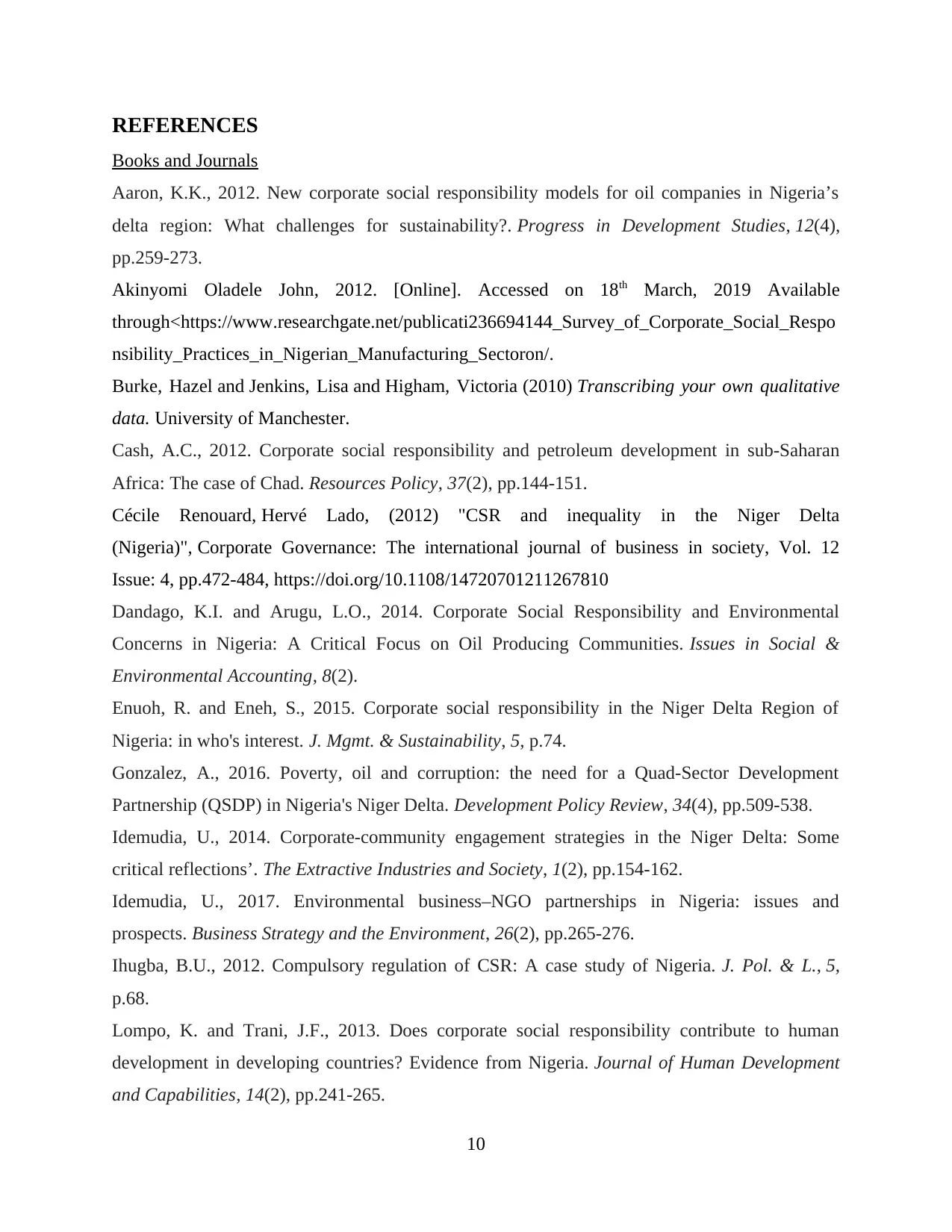
REFERENCES
Books and Journals
Aaron, K.K., 2012. New corporate social responsibility models for oil companies in Nigeria’s
delta region: What challenges for sustainability?. Progress in Development Studies, 12(4),
pp.259-273.
Akinyomi Oladele John, 2012. [Online]. Accessed on 18th March, 2019 Available
through<https://www.researchgate.net/publicati236694144_Survey_of_Corporate_Social_Respo
nsibility_Practices_in_Nigerian_Manufacturing_Sectoron/.
Burke, Hazel and Jenkins, Lisa and Higham, Victoria (2010) Transcribing your own qualitative
data. University of Manchester.
Cash, A.C., 2012. Corporate social responsibility and petroleum development in sub-Saharan
Africa: The case of Chad. Resources Policy, 37(2), pp.144-151.
Cécile Renouard, Hervé Lado, (2012) "CSR and inequality in the Niger Delta
(Nigeria)", Corporate Governance: The international journal of business in society, Vol. 12
Issue: 4, pp.472-484, https://doi.org/10.1108/14720701211267810
Dandago, K.I. and Arugu, L.O., 2014. Corporate Social Responsibility and Environmental
Concerns in Nigeria: A Critical Focus on Oil Producing Communities. Issues in Social &
Environmental Accounting, 8(2).
Enuoh, R. and Eneh, S., 2015. Corporate social responsibility in the Niger Delta Region of
Nigeria: in who's interest. J. Mgmt. & Sustainability, 5, p.74.
Gonzalez, A., 2016. Poverty, oil and corruption: the need for a Quad‐Sector Development
Partnership (QSDP) in Nigeria's Niger Delta. Development Policy Review, 34(4), pp.509-538.
Idemudia, U., 2014. Corporate-community engagement strategies in the Niger Delta: Some
critical reflections’. The Extractive Industries and Society, 1(2), pp.154-162.
Idemudia, U., 2017. Environmental business–NGO partnerships in Nigeria: issues and
prospects. Business Strategy and the Environment, 26(2), pp.265-276.
Ihugba, B.U., 2012. Compulsory regulation of CSR: A case study of Nigeria. J. Pol. & L., 5,
p.68.
Lompo, K. and Trani, J.F., 2013. Does corporate social responsibility contribute to human
development in developing countries? Evidence from Nigeria. Journal of Human Development
and Capabilities, 14(2), pp.241-265.
10
Books and Journals
Aaron, K.K., 2012. New corporate social responsibility models for oil companies in Nigeria’s
delta region: What challenges for sustainability?. Progress in Development Studies, 12(4),
pp.259-273.
Akinyomi Oladele John, 2012. [Online]. Accessed on 18th March, 2019 Available
through<https://www.researchgate.net/publicati236694144_Survey_of_Corporate_Social_Respo
nsibility_Practices_in_Nigerian_Manufacturing_Sectoron/.
Burke, Hazel and Jenkins, Lisa and Higham, Victoria (2010) Transcribing your own qualitative
data. University of Manchester.
Cash, A.C., 2012. Corporate social responsibility and petroleum development in sub-Saharan
Africa: The case of Chad. Resources Policy, 37(2), pp.144-151.
Cécile Renouard, Hervé Lado, (2012) "CSR and inequality in the Niger Delta
(Nigeria)", Corporate Governance: The international journal of business in society, Vol. 12
Issue: 4, pp.472-484, https://doi.org/10.1108/14720701211267810
Dandago, K.I. and Arugu, L.O., 2014. Corporate Social Responsibility and Environmental
Concerns in Nigeria: A Critical Focus on Oil Producing Communities. Issues in Social &
Environmental Accounting, 8(2).
Enuoh, R. and Eneh, S., 2015. Corporate social responsibility in the Niger Delta Region of
Nigeria: in who's interest. J. Mgmt. & Sustainability, 5, p.74.
Gonzalez, A., 2016. Poverty, oil and corruption: the need for a Quad‐Sector Development
Partnership (QSDP) in Nigeria's Niger Delta. Development Policy Review, 34(4), pp.509-538.
Idemudia, U., 2014. Corporate-community engagement strategies in the Niger Delta: Some
critical reflections’. The Extractive Industries and Society, 1(2), pp.154-162.
Idemudia, U., 2017. Environmental business–NGO partnerships in Nigeria: issues and
prospects. Business Strategy and the Environment, 26(2), pp.265-276.
Ihugba, B.U., 2012. Compulsory regulation of CSR: A case study of Nigeria. J. Pol. & L., 5,
p.68.
Lompo, K. and Trani, J.F., 2013. Does corporate social responsibility contribute to human
development in developing countries? Evidence from Nigeria. Journal of Human Development
and Capabilities, 14(2), pp.241-265.
10
⊘ This is a preview!⊘
Do you want full access?
Subscribe today to unlock all pages.

Trusted by 1+ million students worldwide
1 out of 20
Related Documents
Your All-in-One AI-Powered Toolkit for Academic Success.
+13062052269
info@desklib.com
Available 24*7 on WhatsApp / Email
![[object Object]](/_next/static/media/star-bottom.7253800d.svg)
Unlock your academic potential
Copyright © 2020–2026 A2Z Services. All Rights Reserved. Developed and managed by ZUCOL.





